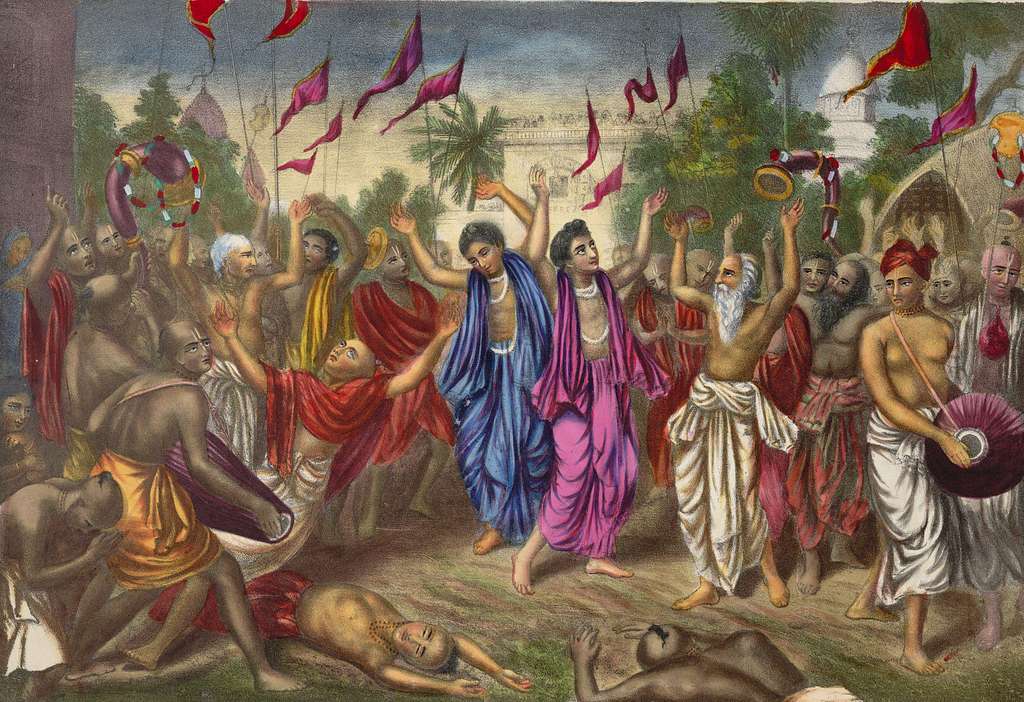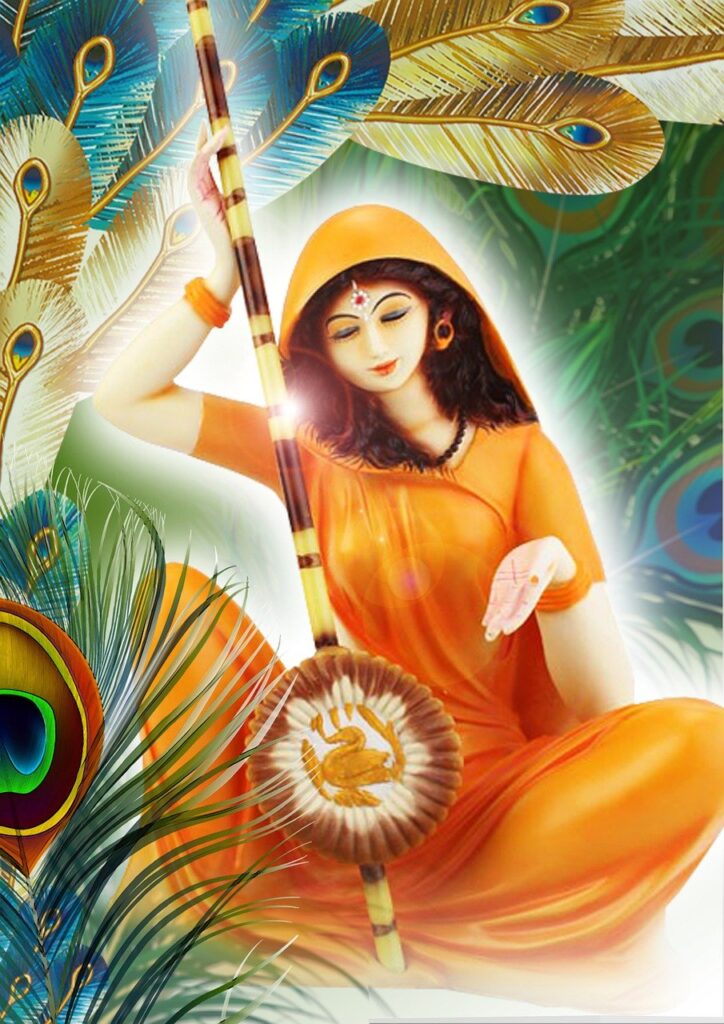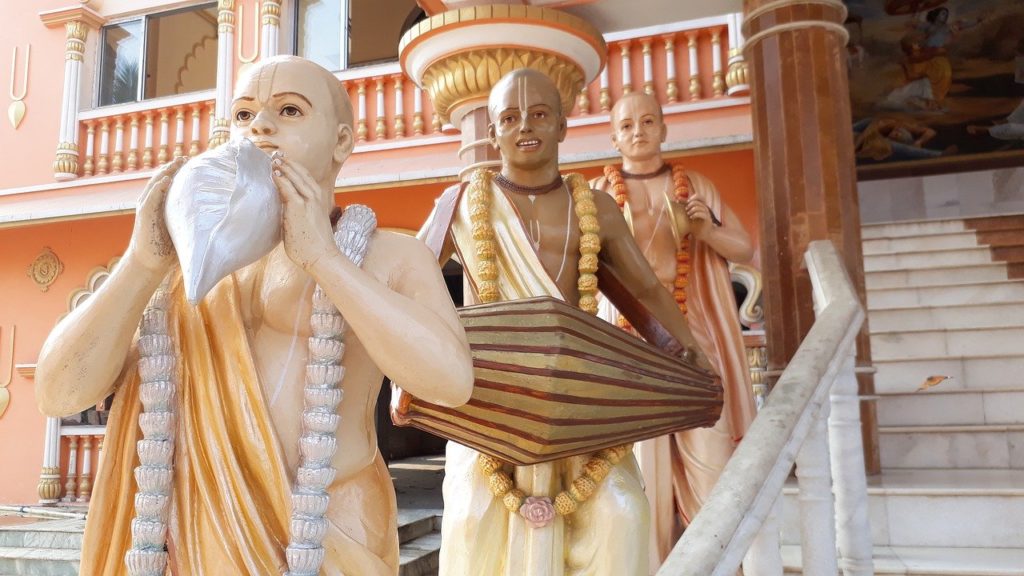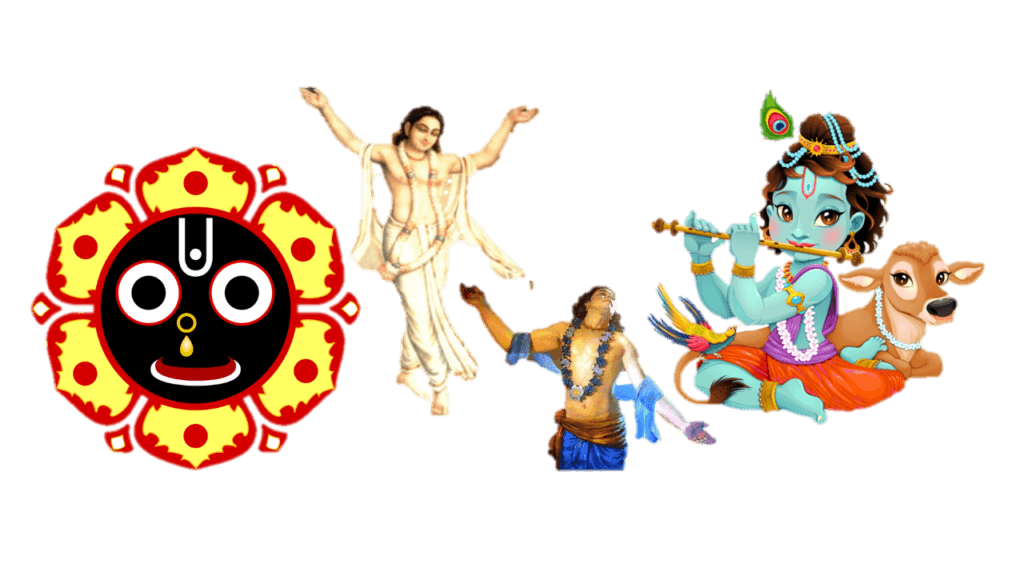 Derived from a Sanskrit root meaning to call, recite, praise, or glorify, kirtan is a deeply rooted spiritual practice that has been embraced by various cultures and religions throughout history. At its core, kirtan is the art of praising and glorifying a divine entity, embodying a profound expression of devotion and reverence. While there are numerous ways to convey this glorification, such as poetry, drama, dance, or recitation, kirtan, in its most recognized form, takes shape as a melodic call and response singing of mantras. These mantras typically focus on revered Hindu deities like Radha, Krishna, Sita, and Rama, who hold significant spiritual significance. Kirtan goes beyond mere musical performance; it serves as a potent means of meditation, enabling individuals to tap into their inner beauty and establish a profound connection with the Supreme Spirit. By engaging in kirtan, practitioners channel their emotions, intentions, and devotion through the harmonious blending of their voices, accompanied by traditional Indian instruments such as the mrdanga (a drum) and kartalas (hand cymbals). This synergy of sound and rhythm creates an immersive experience, cultivating a sense of unity and transcendence among participants. The power of kirtan lies in its ability to uplift and transport individuals beyond the boundaries of the material world, allowing them to delve deep into their spiritual essence. Through the repetition of sacred mantras and the collective energy generated by the participants, kirtan creates a vibrant and transformative environment that awakens the soul and nourishes the heart.
Derived from a Sanskrit root meaning to call, recite, praise, or glorify, kirtan is a deeply rooted spiritual practice that has been embraced by various cultures and religions throughout history. At its core, kirtan is the art of praising and glorifying a divine entity, embodying a profound expression of devotion and reverence. While there are numerous ways to convey this glorification, such as poetry, drama, dance, or recitation, kirtan, in its most recognized form, takes shape as a melodic call and response singing of mantras. These mantras typically focus on revered Hindu deities like Radha, Krishna, Sita, and Rama, who hold significant spiritual significance. Kirtan goes beyond mere musical performance; it serves as a potent means of meditation, enabling individuals to tap into their inner beauty and establish a profound connection with the Supreme Spirit. By engaging in kirtan, practitioners channel their emotions, intentions, and devotion through the harmonious blending of their voices, accompanied by traditional Indian instruments such as the mrdanga (a drum) and kartalas (hand cymbals). This synergy of sound and rhythm creates an immersive experience, cultivating a sense of unity and transcendence among participants. The power of kirtan lies in its ability to uplift and transport individuals beyond the boundaries of the material world, allowing them to delve deep into their spiritual essence. Through the repetition of sacred mantras and the collective energy generated by the participants, kirtan creates a vibrant and transformative environment that awakens the soul and nourishes the heart.
Unveiling the Profound Benefits of Kirtan: Insights from Vedic Texts
Interestingly, an in-depth analysis of the Vedic texts uncovers profound benefits of kirtan that go beyond what can be perceived by the senses or validated through academic research. These texts reveal five key themes when it comes to the effects of chanting:
#1 The first remarkable benefit of kirtan is its ability to obliterate negativity. As stated in the Yoga Sutras (1.27-31), chanting has the power to dissolve “disease, procrastination, laziness, doubt, pain, nervousness, and lamentation.” According to the Vedic-yoga tradition, negative conditions, including physical ailments and mental distress, stem from deep-rooted negative impressions or karma from previous lifetimes. Thus, the true significance of kirtan lies in its capacity to destroy the very seeds of negativity waiting to sprout as a result of past negative actions. In fact, the Brhad-vishnu Purana goes so far as to assert that chanting even a single holy name can eradicate more negative karma than a person is capable of accumulating. By releasing the burden of negativity, individuals naturally experience inner peace and happiness.

#2 The second profound benefit of kirtan is its ability to awaken an inherent sense of bliss and joy within the heart. As Arjuna proclaims in the Bhagavad-gita (11.36), “the world becomes joyful upon hearing your name.” The transformative power of kirtan lies in its capacity to tap into the wellspring of natural joy that resides within each individual, allowing it to radiate and permeate their entire being.
#3 Another significant advantage of kirtan is its simplicity and accessibility. The Skanda Purana asserts that even chanting the name of Hari (a name for Krishna that signifies the remover of all distress) once guarantees liberation. This ease of practice positions kirtan as the most practical method for attaining spiritual perfection, particularly in the present age.
#4 Kirtan is hailed as the topmost spiritual process, according to the Srimad Bhagavatam. It is described as the “ultimate spiritual practice” (6.3.22) and the “doubtless and fearless way of success” (2.1.11) in all endeavors, be they spiritual or material. Similarly, the Bhagavad-gita (10.25) extols kirtan as the highest form of sacrifice, emphasizing its unparalleled status among spiritual practices.
#5 Lastly, kirtan establishes a profound connection with the Divine. This connection manifests in two ways: as the presence of the Divine and as a loving bond between the chanter and the Divine. Krishna reveals to Narada in the Padma Purana, “My dear Narada, actually I do not reside in my abode, Vaikuntha, nor do I reside in the hearts of yogis. I reside in that place where devotees sing my holy names.” Thus, kirtan serves as a conduit for experiencing the divine presence and nurturing a deep affectionate relationship between the practitioner and the Divine.
Kirtan: A Profound Spiritual Journey and Soul-Nourishing Experience
Kirtan, with its multifarious melodies and spiritual mantras, immerses participants in a meditative state, facilitating a profound connection to the Divine. The potency of the mantras, accompanied by rhythmic instruments, transforms consciousness and eliminates negativity, transcending the limitations of the material senses. Mantras are powerful tools that deliver the mind and facilitate higher states of awareness and clarity.
Two particularly recommended mantras in the Vedic literatures are ‘OM’ and the ‘Hare Krishna maha-mantra’ (Hare Krishna Hare Krishna Krishna Krishna Hare Hare, Hare Rama Hare Rama Rama Rama Hare Hare). The Hare Krishna maha-mantra holds special significance in the current age, as it directly connects with the Supreme through the holy names of the Lord. By chanting these names, individuals come into immediate contact with God, experiencing His presence and deriving spiritual nourishment.

Kirtan glorifies these holy names and acts as a spiritual journey, starting with a slow tempo and gradually building to euphoric crescendos. The uplifting melodies and diverse instruments create an atmosphere charged with spiritual energy, evoking extreme joy and delight. All individuals, regardless of musical ability or background, can participate, fostering unity and transcending mundane limitations. The spiritual sound vibration of kirtan carries divine qualities and offers the easiest method to connect with the spiritual realm. In a world driven by material pursuits, the soul seeks deeper satisfaction. Kirtan answers this longing, nourishing the spiritually-starved soul and providing a connection to its source. By engaging in kirtan, individuals find solace, fulfillment, and a profound reconnection with their spiritual essence.
Chaitanya mahaprabhu and the Transformative Power of Kirtan
Chaitanya Mahaprabhu, a revered saint of the sixteenth century, born in Bengal, India, is widely regarded as an incarnation of the Supreme Lord. His teachings placed great emphasis on Kirtana, the congregational chanting of Lord Krishna’s holy names. Chaitanya propagated the concept of “kirtaniya sada Hari,” urging individuals to constantly sing the glories of Lord Hari (Krishna). He highlighted the transformative power of uttering God’s name in attaining liberation. Kirtan, as introduced by Chaitanya, became central to the path of enlightenment embraced by his disciples.

In the context of Bengali Vaishnavism, kirtan serves as the manifestation of devotion, channeling deep spiritual sentiments. Its history traces back to Jayadeva’s Gitagovinda, a Sanskrit composition glorifying the love of Radha and Krishna. Influential figures like Vidyapati and Badu Chandidas further contributed to the development of kirtan as a well-defined genre of devotional performance, complete with established forms and musical rules. Chaitanya Mahaprabhu not only upheld the existing traditions but also democratized the practice of kirtan, making it accessible to all. He preached its profound benefits, including the cleansing of the heart from sinful impressions, the cessation of the cycle of birth and death, the awakening of auspiciousness and good fortune, the revelation of one’s true spiritual nature and relationship with the Divine, the experience of supreme bliss, the bestowal of immortality, and the purification of one’s selfish desires to foster selfless love for the Divine.
In essence, Chaitanya Mahaprabhu’s teachings on kirtan encompass a holistic and transformative spiritual practice that resonates with seekers across time and continues to inspire devotees to engage in the joyful and uplifting congregational chanting of Lord Krishna’s holy names.
Kirtan: A Melodic Journey to Divine Devotion
Derived from ancient roots of praise and glorification,
Kirtan embraces spirituality, a timeless dedication.
Through rhythmic melodies and heartfelt chants,
The soul finds solace in divine expanse.
Call and response, a sacred interplay,
As voices unite, connecting souls in array.
Mantras resonate, permeating the air,
Transcending limitations, leading minds to repair.
Radha, Krishna, Sita, Rama, revered and adored,
Focused in kirtan, their essence is explored.
With mrdanga and kartalas, traditional sounds,
The music awakens, divine energy abounds.
Beyond mere performance, kirtan weaves a spell,
Invoking meditation, where inner beauty dwells.
Harmonious voices blend, emotions unfold,
A symphony of devotion, a unity untold.
Negativity dissolves, as kirtan takes flight,
The Yoga Sutras reveal its transformative might.
Disease, doubt, and pain, washed away,
Leaving peace and happiness to eternally stay.
Srimad Bhagavatam hails it the topmost practice,
A doubtless way to success, a divine axis.
As sacrifice and spiritual process it stands,
Revealing the truth held in divine hands.
A connection with the Divine, kirtan unveils,
A presence felt, where devotion prevails.
In the Padma Purana, Krishna reveals His abode,
Where devotees sing, He resides, love bestowed.
Chaitanya Mahaprabhu, an incarnation revered,
Preached kirtan, its benefits widely adhered.
Congregational chanting, Hari’s name on the tongue,
Liberation obtained, through songs sung.
Bengali Vaishnavism embraced kirtan’s allure,
Jayadeva and Vidyapati, its history secure.
Chaitanya democratized, made it open to all,
Devotion’s manifestation, deep sentiments enthrall.
Kirtan’s spiritual vibration, divine energy imbued,
Nourishes the soul, fulfilling its solitude.
Amidst a material world, seeking satisfaction’s embrace,
Kirtan provides solace, a connection to a higher place.
With Chaitanya’s teachings, kirtan’s flame burns bright,
A transformative practice, guiding seekers to light.
In joyful congregations, devotees unite,
Chanting Krishna’s holy names, divine love ignites.
